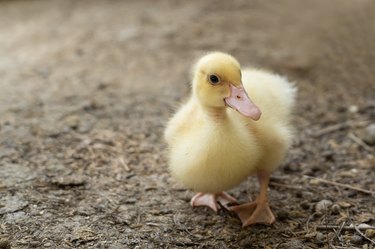Ducks are prey animals, and many of their behaviors are designed to help protect themselves. Duck sleeping habits, such as sleeping in groups, unihemispheric sleeping, and sleeping in short spurts throughout the day and night, help ducks protect themselves from their predators while they rest. A duck's sleeping habits are also influenced by environmental factors.

Video of the Day
Duck sleeping habits: schedule and formation
Ducks are considered seminocturnal, so it's not uncommon for them to be awake for part of the night to fly or feed. Ducks tend to take several short naps throughout the day.
Video of the Day
Ducks who sleep in groups are safer than ducks who sleep alone. Ducks who sleep in groups tend to sleep in a row. The ducks on either end of the row sleep unihemispherically, acting as guard ducks for the entire group while the ducks in the middle are able to fully rest.
Ducks can sleep unihemispherically
Ducks have the ability to sleep unihemispherically when necessary. This means that the duck shuts off only half of his brain while he sleeps. A duck sleeping unihemispherically sleeps with one eye open, allowing him to detect and react quickly to predators while he rests.
The guard ducks at the end of a sleeping row will close the eye facing the group while keeping the eye facing the outside open. When a guard duck senses a predator, he is able to wake up quickly and warn the rest of the group.
Duck sleeping location
Where a duck chooses to sleep depends on her breed as well as environmental conditions. Some breeds of ducks prefer to sleep floating on the water. Sleeping on the water is advantageous because it allows ducks to sense the presence of certain types of predators. Specifically, the movement or ripple of the water warns ducks that a predator may be approaching.
Other ducks, such as those within the perching duck species, prefer to sleep in trees where ground predators cannot reach them. These ducks include pink-eared ducks, Muscovy ducks, Mandarin ducks, teals, and comb ducks among others.
Weather conditions and potential threats also affect a duck's decision about where to sleep. For instance, if it's a warm, sunny day, a duck may choose to sleep on a rock or on top of the water, whereas if it's cold or rainy outside, a duck may seek a cave or a hole in a tree.
How ducks stay warm while sleeping
In addition to finding warm places to sleep, such as holes in trees and caves, a duck's body is designed to help keep her warm in cold temperatures. A duck's feathers provide her with warmth and insulation.
Ducks also sleep in positions that allow them to conserve body heat in cold weather. For instance, a duck sleeps with one foot on the ground and the other tucked into her feathers to help keep herself warm. Like a duck's feet, a duck's bill has no feathers, which means these body parts have no insulation. A duck will tuck her bill into her feathers in cold temperatures to help keep herself warm.
If you have ducks, you can help make them comfortable during the winter months by giving them extra bedding or straw in their coop. Make sure your coop has proper ventilation to prevent moisture buildup. Too much moisture can lead to respiratory issues for ducks.